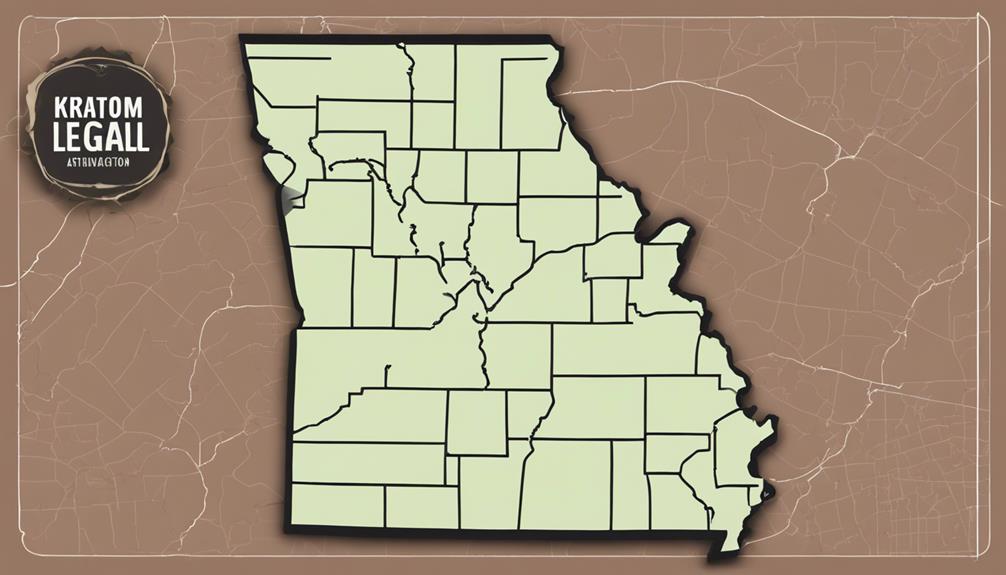While some states have embraced the potential benefits of kratom, Arkansas stands firmly against its legality. The strict regulations and severe consequences associated with kratom possession in the state have sparked debates and raised questions about individual freedoms and public health. Understanding the reasons behind Arkansas's stance on kratom can shed light on the complexities of drug policies and the challenges faced by advocates seeking change.
Key Takeaways
- Kratom is illegal in Arkansas since 2016.
- Arkansas classifies kratom as a Schedule I Controlled Substance.
- Possession, sale, or purchase of kratom results in severe penalties.
- Legislative actions solidify the ban on kratom in Arkansas.
- Lobbying efforts and advocacy for legalizing kratom are ongoing in Arkansas.
Current Legal Status of Kratom in Arkansas

The legality of kratom in Arkansas is strictly prohibited, with the state enforcing a complete ban on the purchase, sale, and possession of this substance since 2016. Classified as a Schedule I Controlled Substance, kratom falls under strict regulations in Arkansas, with severe penalties for violations. The active alkaloids in kratom, mitragynine, and 7-hydroxymitragynine were specifically banned by the Arkansas Senate in 2016. Possession of kratom in Arkansas can result in legal consequences such as imprisonment for up to 20 years and a fine of $15,000. The state has not shown any leniency towards kratom, maintaining a firm stance against its use and distribution. It is important to understand the gravity of the situation surrounding kratom in Arkansas to avoid facing the harsh penalties associated with its possession or sale. Stay informed about the laws and regulations in Arkansas to steer clear of any legal trouble related to kratom.
Legislative Actions Against Kratom in Arkansas
Legislative actions in Arkansas have solidified the complete ban on kratom since 2016, with strict penalties in place for its possession or sale. The state Senate's decision specifically targeted the active alkaloids in kratom, mitragynine, and 7-hydroxymitragynine, leading to the herb's prohibition. False information and skepticism from the FDA played a role in shaping the legislative landscape against kratom in Arkansas. Possession of this substance in the state can result in severe consequences, including imprisonment and fines. Since the ban in 2016, Arkansas has not shown any indication of intending to repeal or amend the legislation prohibiting kratom. It is essential to be aware of the strict laws surrounding kratom in Arkansas to avoid facing legal repercussions. Stay informed about any potential changes in legislation regarding kratom to make certain compliance with the established regulations.
Impact of DEA's Temporary Ban on Kratom in Arkansas

Following the DEA's temporary ban on kratom in Arkansas, the impact on existing state regulations and enforcement measures will be scrutinized to assess any potential shifts in the legal landscape. Arkansas had previously classified kratom's key components, mitragynine and 7-hydroxymitragynine, as Schedule I controlled substances, aligning with the DEA's stance on the plant. Despite advocates suggesting kratom's potential therapeutic benefits for conditions like PTSD and chronic pain, both the DEA and Arkansas Department of Health have maintained that it lacks an accepted medical use. The ban reinforced existing state laws that already deemed kratom illegal for purchase, sale, and possession in Arkansas, subjecting violators to harsh penalties. Research conducted during this ban period will play an important role in determining the future legality of kratom within the state. Arkansas lawmakers may need to reevaluate their stance on kratom based on the outcomes of these studies and any potential federal regulatory changes.
What is the Legal Status of Kratom in Arkansas?
The current status of kratom legality in South Carolina is uncertain. There have been attempts to ban it in the past, but as of now, kratom is legal to buy, sell, and possess in the state. However, it is always best to stay informed about any potential changes in the law.
Enforcement of Kratom Laws in Arkansas
Enforcing kratom laws in Arkansas involves strict penalties for possession, sale, and purchase of the substance due to its classification as a felony offense. The state has taken a firm stance against the possession of kratom, with severe consequences for those who violate the laws surrounding this controlled substance. Here are some key points to bear in mind regarding the enforcement of kratom laws in Arkansas:
- Felony Classification: Possessing even a small amount of kratom can lead to a class D felony in Arkansas, highlighting the seriousness with which the state treats this issue.
- Mitragyna Speciosa Tree Alkaloids: The active alkaloids in kratom, mitragynine and 7-hydroxymitragynine, are banned by state legislators in Arkansas, emphasizing the scrutiny placed on this natural substance.
- Public Possession: Public possession of kratom near certain institutions can result in an additional 10-year sentence in Arkansas, showing the strict enforcement measures in place.
- Legal Status: Despite some vendors still shipping kratom to banned states, buying, selling, or possessing kratom in Arkansas is illegal and punishable by law, underscoring the continued enforcement efforts in the Natural State.
What is the Legal Status of Kratom in Surrounding States Like Arkansas?
The kratom legality in oklahoma is important to consider when understanding the legal status of kratom in surrounding states like Arkansas. While kratom is legal in Oklahoma, it is banned in Arkansas. It’s crucial to be aware of the varying regulations in different states to avoid any legal issues.
Future of Kratom Legality in Arkansas

Considering the current advocacy efforts and ongoing push for legal consumption of kratom, the future of kratom legality in Arkansas appears to be at a crucial juncture. Lobbyists are actively working to overturn the Arkansas ban on kratom, with support from the American Kratom Association (AKA) advocating for the adoption of the Kratom Consumer Protection Act (KCPA) in all states. The KCPA aims to regulate the kratom industry, and its adoption in several states sets a precedent for potential regulatory measures in Arkansas. The AKA's influence in supporting pro-kratom laws can sway decisions in Arkansas and other states. Therefore, the future changes in Arkansas's kratom laws may be significantly influenced by these ongoing advocacy efforts. The outcome will likely depend on the effectiveness of lobbying initiatives and the extent to which regulatory bodies and lawmakers are receptive to the arguments presented by proponents of legal kratom consumption. Stay informed on the evolving landscape of kratom laws to understand how the future of kratom legality in Arkansas unfolds.










